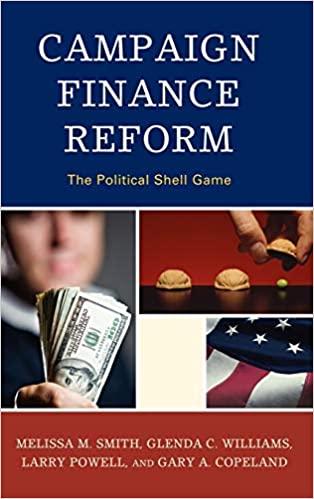Question
Which of the following statements about dividend is NOT true? _____ Bird-in-the-hand theory says that investors think dividends are less risky than potential future capital
Which of the following statements about dividend is NOT true? _____
|
| Bird-in-the-hand theory says that investors think dividends are less risky than potential future capital gains, so they like dividends. | |
|
| Tax preference theory indicates that low dividend payments mean higher capital gains. Capital gains taxes are lower than dividend taxes, and they can be deferred. So investors prefer low-dividend-payments or non-dividend-payments firms. | |
|
| Based on the Bird-in-the-hand theory, a firm should set low dividend payout ratio to increase firm value. | |
|
| Based on the Tax preference theory, a firm should pay less dividends to increase firm value. |
The MM irrelevance capital structure theory proved that a firm's value is unaffected by its capital structure. But their study was based on all of the following strong assumptions excluding : _____
|
| There are no brokerage costs. | |
|
| There are corporate taxes and personal taxes. | |
|
| There are no bankruptcy costs and agency costs. | |
|
| There is no asymmetric information problem, and all investors can borrow at the same rate as corporations. |
You currently own 1 share of stock in Berkshire Hathaway Inc. The stock currently trades at $195,000 a share. The company is contemplating a 1000-for-1 stock split. Which of the following best describes your position after the proposed stock split takes place? _____
|
| You will have 1 share of stock with $195,000 a share. | |
|
| You will have 1 share of stock with $195.0 a share. | |
|
| You will have 1,000 shares of stock with $195,000 a share. | |
|
| You will have 1,000 shares of stock with $195.0 a share. |
If the information content, or signaling, hypothesis is correct, changes in dividend policy can be important because investors view dividend changes as signals of management's view of the future. _____
|
| True | |
|
| False |
A firm has fixed operating costs of $500,000, variable costs of $4.00 per unit produced, and its products sell for $5.00 per unit. What is the company's breakeven point, i.e., at what unit sales volume would income equal costs?
|
| 200,000 | |
|
| 250,000 | |
|
| 300,000 | |
|
| 500,000 |
A company has a levered beta of 1.60, its capital structure consists of 50% debt and 50% equity, and its tax rate is 40%. What would the firm's beta be if it used no debt, i.e., what is its unlevered beta?
|
| 0.39 | |
|
| 0.80 | |
|
| 1.0 | |
|
| 1.6 |
There are two firms: Firm U and Firm L. Both firms have $100M total assets and $20M EBIT (earnings before interest and taxes). Firm U is an unleveraged firm without debt. Firm L is a leveraged firm with 40% of debt and 60% of common equity. The pre-tax cost of debt for Firm L is 10%. Both firms have 30% corporate tax rate. Calculate the return on equity (ROE) for the unleveraged firm U and leveraged firm L ______
|
| 9.6%, 13.2% | |
|
| 14.0%, 18.7% | |
|
| 12.0%, 16.0% |
A company expects to have net income of $5,000,000 during the next year. Its target capital structure is 30% debt and 70% equity. The company has determined that the optimal capital budget for the coming year is $6,000,000. If Davis follows a residual distribution policy (with all distributions in the form of dividends) to determine the coming year's dividend, then what is Davis's dividend payout ratio? _____
|
| 25% | |
|
| 40% | |
|
| 30% | |
|
| 16% |
A stock was trading at $200 per share before its recent 4-for-1 stock split. The 4-for-1 split led to a 5% increase in the stock price. What was the stock price after the stock split? _____
|
| $52.5 | |
|
| $55 | |
|
| $200 | |
|
| $220 |
Step by Step Solution
There are 3 Steps involved in it
Step: 1

Get Instant Access to Expert-Tailored Solutions
See step-by-step solutions with expert insights and AI powered tools for academic success
Step: 2

Step: 3

Ace Your Homework with AI
Get the answers you need in no time with our AI-driven, step-by-step assistance
Get Started


